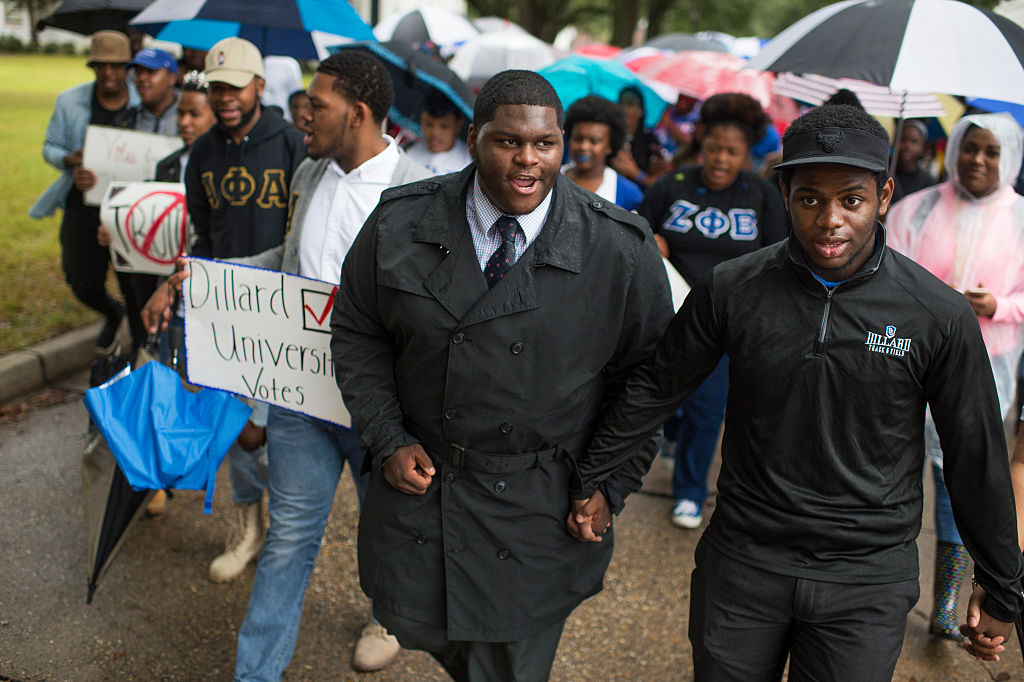HBCU Voting Power: How Young Black Voters Are Creating Change
Dillard University students march to their polling place on campus to vote in New Orleans on Nov. 8, 2016. | Source: Tom Williams / Getty
The worst kept secret perhaps in all of politics is that students at historically Black colleges and universities (HBCUs) are a pivotal demographic when it comes to voting. The political power of these students is on display in nearly every major election and with midterms quickly approaching, this year is no different.
Dylan Sellers, the National HBCU Manager of the Campus Vote Project, an organization that has been working with HBCUs to increase voter engagement and voter turnout, says that HBCUs have the power to swing elections and that’s the main reason why they are always under attack.
“We are talking about the difference between whether a candidate wins or loses. Which is why HBCUs have consistently been under attack when it comes to redistricting,” said Sellers in an exclusive with NewsOne. “They are gerrymandered when it comes to election laws. They are targeted because everyone knows that if these students show up they change elections nationally and locally.”
He added: “A lot of these HBCUs are the biggest voting block in the town. So locally they can swing an election just by showing up and that’s known and that’s the reason they’ve been under attack.“
MORE: North Carolina A&T Senior Aigné Taylor Is Leading A New Generation In The Fight For Voting Rights
Sellers works with these institutions to help them develop plans to get more students voting. One of those initiatives is to help these schools hire their students to increase voting interest on campus.
There has been an augmented emphasis on making sure that HBCU students know their power in voting, especially in non-presidential elections. Recently, former First Lady Michelle Obama and NBA superstar Chris Paul announced they were teaming up to create a campaign that inspires HBCU students to get even more active at the ballot box.
For decades, these students have been crucial parts of American democracy but they have faced a plethora of challenges along the way and they aren’t subsiding now.
“What ranks among the top is resources to actually do the work,” said Sellers. “Also, misinformation is something the students mentioned a great deal about. They are combating messages from social media about voting that think those things may not be true. And not necessarily feeling the support from third-party organizations.”
MORE: Bethune Cookman Senior Angel Edwards’ Quest To Empower Black Communities Through Voting Rights
In addition to these hindrances, there is a lack of trust in the voting system that exists among Black people that comes from years of voter suppression and unfulfilled promises. Sellers believes the key to unlocking the voting potential in this group is to listen and understand that their concerns are legitimate.
“That lack of trust comes from a very real place, and there are legitimate concerns that they are voicing both from a historical perspective and their own personal experiences of being turned away from voting,” said Sellers. “Letting them know that they are being heard goes a long way.”
Despite the difficulties that exist, Sellers said that they are seeing gains in HBCU student voting numbers over the last six years. In 2020, the organization saw a significant increase of HBCU students and Black students at PWIs when it came to voting.
We have to continue to empower this demographic of voters to be confident and to make their voices heard at the ballot box. This generation of young Black voters will be pivotal in the quest to create change.
“Black students in this country are not apathetic, they are very politically involved and most of the political change we have seen in recent years have come from Black students,” said Sellers. “It’s important for us to maintain that momentum and give them the resources that they need to continue that.”
SEE ALSO:
How HBCU Campus Culture Has Changed During The Pandemic
Howard Alum Creates Lucrative HBCU Apparel Partnership With The Brooklyn Nets

